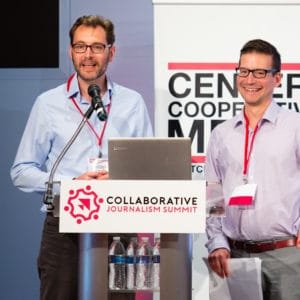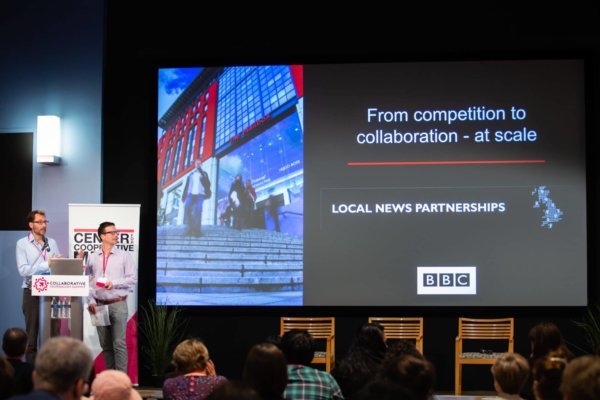BBC’s local democracy reporting collaborative a ‘moral good’

Matthew Barraclough, left, and Peter Sherlock present at the 2019 Collaborative Journalism Summit. Photo by Leslie Barbaro.
At least 10 counties and more than 1,300 communities in the United States have lost local news coverage as newspapers have shut down or dramatically slashed staff, creating “news deserts” all around the country.
Across the pond, local coverage also has taken a hit. The number of local newspapers in the United Kingdom dropped from 1,303 in 2007 to 982 in 2017.
In the opening keynote presentation at the Collaborative Journalism Summit on May 17, BBC journalists Matthew Barraclough and Peter Sherlock spoke about how the dearth of local coverage sparked a partnership in 2017 with the News Media Association that has resulted in the hiring of more than 150 reporters and production of nearly 74,000 stories.
That initiative is called the Local Democracy Reporting Service and is part of the BBC’s larger collaborative Local News Partnerships project. The reporters, the BBC journalists explained, cover local issues, particularly the actions of government agencies.
“It is a moral good,” Barraclough said of BBC’s role in supporting local reporting. “It’s right. We believe that local news is really important to the country. We won’t solve the problem of [shrinking] local news, but we do have an obligation to be a good neighbor and to support it.”
Reporters hired into the partnership are required to have a minimum of two years of journalism experience. Their salaries are paid by the BBC but they are employed by the local news organizations where they are placed. The BBC, a public service broadcaster, also provides its vast resources to partner news organizations, and has committed to spending about $10 million a year on the project.
“We want them to bring their own story ideas and specialties,” Sherlock said of the reporters. “The projects need to be of public interest.”
Barraclough said that the stories must adhere to the BBC’s rigorous standards.
“Our role is to do quality assurance,” he said of the BBC’s editorial role. “We don’t tell those reporters what to do. They [only] need to act in the public interest.”

Matthew Barraclough, left, and Peter Sherlock present at the 2019 Collaborative Journalism Summit. Photo by Leslie Barbaro.
The work of the local democracy reporters is made available to the roughly 900 news outlets that have signed up for access to the stories. The outlets can use the stories, as well as audio and video components, on any platform and shape them for their audience.
“We’re maybe not natural collaborators,” Barraclough said of news organizations. “Competition is something you may have been weaned on.”
“But collaboration and competition can co-exist,” he said.
The partnership’s stories essentially serve as a wire service, the presenters said. Even the smallest news outlets, Barraclough said, get about three stories a day they can use.
The partnership has generated stories that have, among other things, prompted a politician to resign and exposed how cuts to legal aid agencies had forced hundreds of providers to scale back their services.
Reporter Dominic Gilbert of the Eastern Daily Press produced the legal aid expose after getting the evidence he needed by applying the data-mining training he received through the partnership.
Gilbert wrote a story showing that funding for legal aid providers had been cut by half in six years, leaving people to represent themselves in court, even for complicated cases.
“He had tons of anecdotal evidence,” Sherlock said. “He had a hunch that cuts to legal aid” had decimated services.
“After showing him how to mine and analyze the data, he found his hunch was right,” he added. “This was public interest journalism that led to change in the U.K. … and public authorities being held to account.”
The moderator, Denise James, a journalism professor at Temple University, asked the BBC journalists what a large outlet such as their news organization gains from working with smaller, often hyperlocal, ones.
They responded that the BBC, which tends to take “a helicopter view” of news, now has a more organic and nuanced feel for issues in U.K. communities.
It enables the BBC to connect the dots, and see patterns that are playing out on a local level across the U.K.
“We want to maintain our editorial scale,” Barraclough said, “to be able to spot things before anyone else does, and we’re doing that increasingly.”
At the same time, partnering with small news outlets allows the BBC to engage new audiences, he said.
“If a commercial radio station with a much younger demographic, if they run our stories, we are reaching a whole bunch of people who we’ll never reach if we just focus on our own [national] real estate.”
Sherlock said that the BBC has benefited from the fresh perspectives and unique skills of local reporters.
“They bring fresh air into our newsroom,” he said. “The journalists who come benefit from the technical skills we give them. We also benefit. … We have had an influx of journalists with local contacts and specialties that our team has lacked.”

